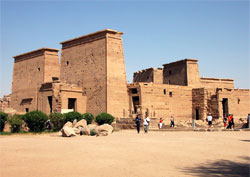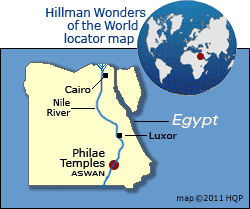



Philae Temples
Travel tips you can trust


Why the
Philae Temples
are special
This stately temple complex on a Nile island once drew pilgrims from the far reaches of the Ancient Egyptian and Roman empires. Today, the Philae Temples are one of Egypt's popular tourist draws.
Philae Temples
tips and insights
 How to pronounce
How to pronounce
Philae = fye-lee
 Buildings
Buildings
By far the biggest and most significant building is the one dedicated to the goddess of Iris (see photo). Other major structures include the Kiosk of Trajan and the temples dedicated to Isis' husband Osiris and son Horus.
 History in brief
History in brief
 Early history
Early history
The major structures were built over eight centuries, from the 4th century BC Ptolemaic era into Roman times.
 Middle history
Middle history
In the 6th century, the Temple of Isis was converted into a church. In the 7th century, it became a mosque. Over the ensuing years the site gradually fell into disuse except as a tourist curiosity.
 Recent History
Recent History
The Philae Temples became partially inundated annually from January to March when the Aswan Low Dam was built in the early 1900s.
Then, decades later, when the new Aswan High Dam was built, the entire island faced total and forever submersion.
The buildings were rescued by dismantling and reassembling them on a nearby higher island (which was renamed "Philae", the name of the old and now submerged island).
 Convenient location
Convenient location
The island is close to Aswan city, the starting or ending river port of most Nile Cruises.
The Philae Temples venue is typically combined with a worthwhile stop at the immense, world-renowned Aswan High Dam.
And the gold-medal winning Hillman wonder Abu Simbel is within day-trip range of Aswan.
 Location in Egypt
Location in Egypt

Read about each of Egypt's top 7
 Pyramids of Egypt at Giza
Pyramids of Egypt at Giza
 Karnak Temple
Karnak Temple
 Nile River Cruise
Nile River Cruise
 Egyptian Museum
Egyptian Museum
 Valley of the Kings
Valley of the Kings
 Abu Simbel
Abu Simbel
 Luxor Temple
Luxor Temple
Photo by Dennis Jarvis - CC BY-SA 2.0


World's Top 100 Wonders
World's Top 1000 Wonders
Site map
My credentials
About my website and criteria
Reader testimonials



